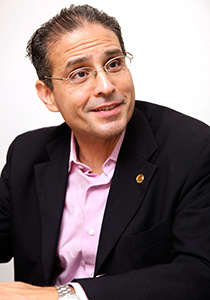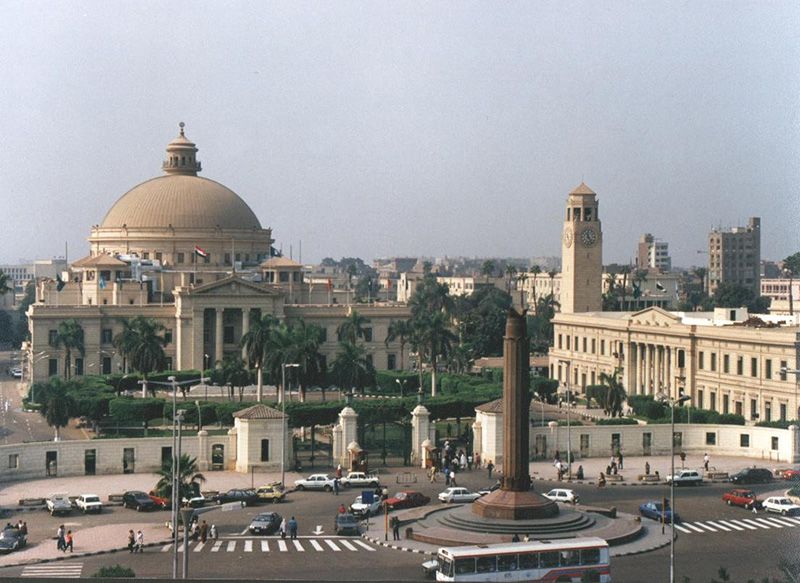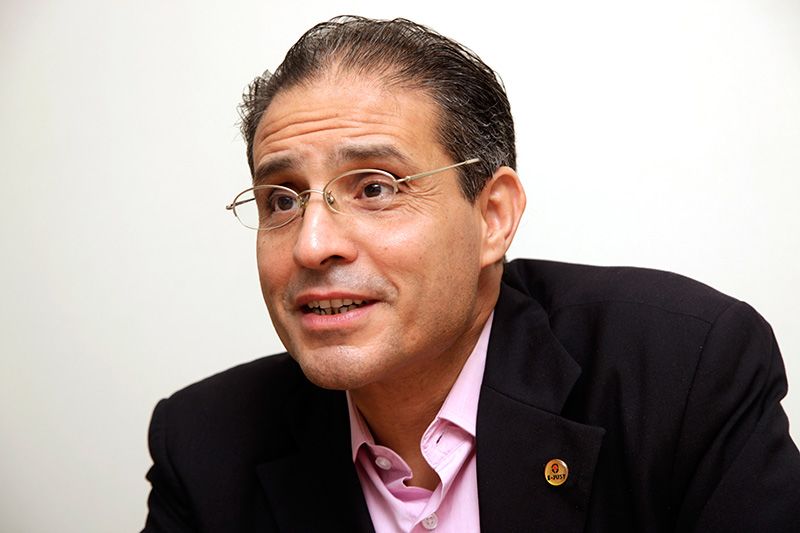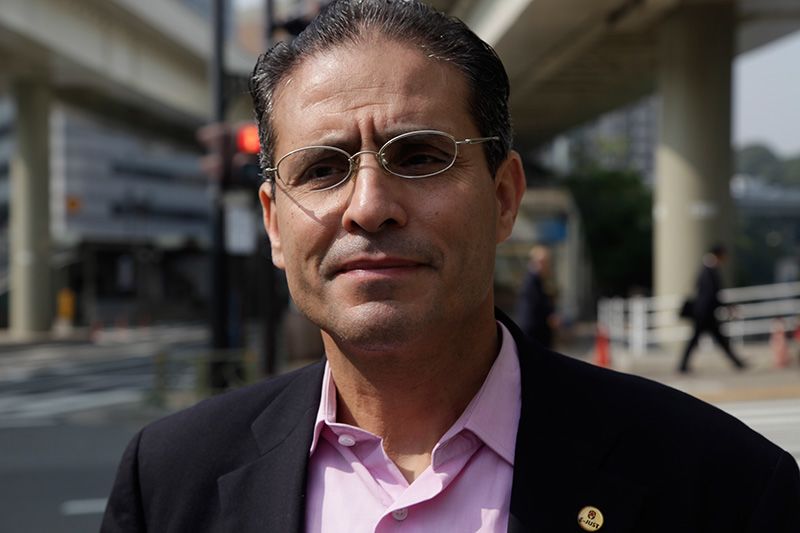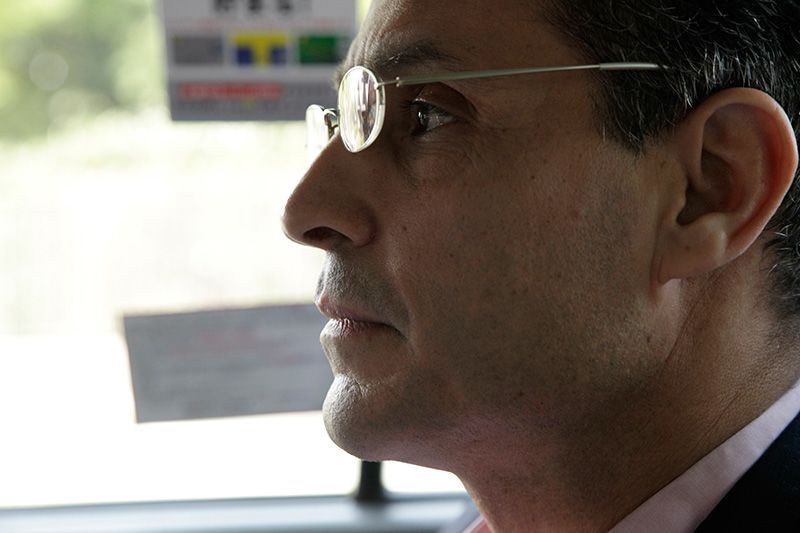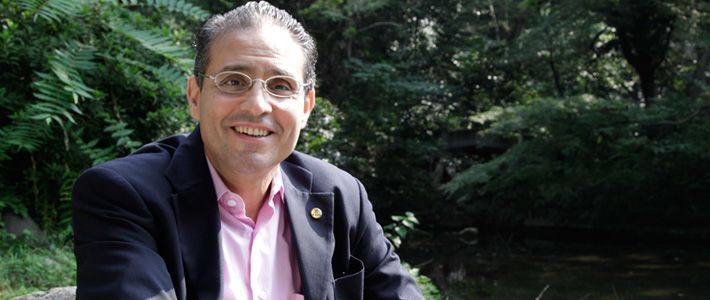
Japanese Studies in the Arab World
Politics Culture- English
- 日本語
- 简体字
- 繁體字
- Français
- Español
- العربية
- Русский
The 2011 Japan Foundation Award for Japanese Language went to the Department of Japanese and Japanese Literature, Faculty of Arts, Cairo University. This prize is awarded to individuals or organizations for contributions to mutual understanding between Japan and the rest of the world. Founded in 1974, the department is now the center of Japanese language education and research on Japan in the Arab world. The department’s faculty members and former students have produced numerous books and translations, and the program has made a major contribution to understanding of Japan in the Middle East and Africa. During a visit to Japan to attend the award ceremony, Professor Karam Khalil spoke to Nippon.com about the state of Japanese language education in the Arab world today.
Growing Arab Interest in Japan
INTERVIEWER How popular is Japanese as a subject these days?
KARAM KHALIL At Cairo University, the number of students has increased dramatically over the past few years. This year, we had 140 applicants for 20 places. In some years, there has been more competition for places on our course than for English, which has traditionally been the most popular foreign language.
To tell you the truth, this has come as a surprise even to me. I was part of the third class to graduate from the program. In those days, this level of popularity would have been unimaginable. Back then, it was so hard to attract students that some people were more or less forced into the program!
INTERVIEWER The situation must have changed a lot since then.
KARAM I entered the program in 1976. I think the motivations of people applying to the program have changed dramatically in the years since then. In the 1970s, Japan was still going through a period of ongoing, high-paced economic growth. A lot of people chose to study Japanese to find out how Japan had developed its economic power. It was quite a serious, high-minded motivation, you might say.
Then, in the 1980s, the NHK drama series Oshin was shown first in Egypt and later in other Arab countries. This had a huge impact in terms of increasing awareness of Japan. People started to feel a kind of closeness and affinity with Japan, and this led to more people taking up the language. The momentum grew from there.
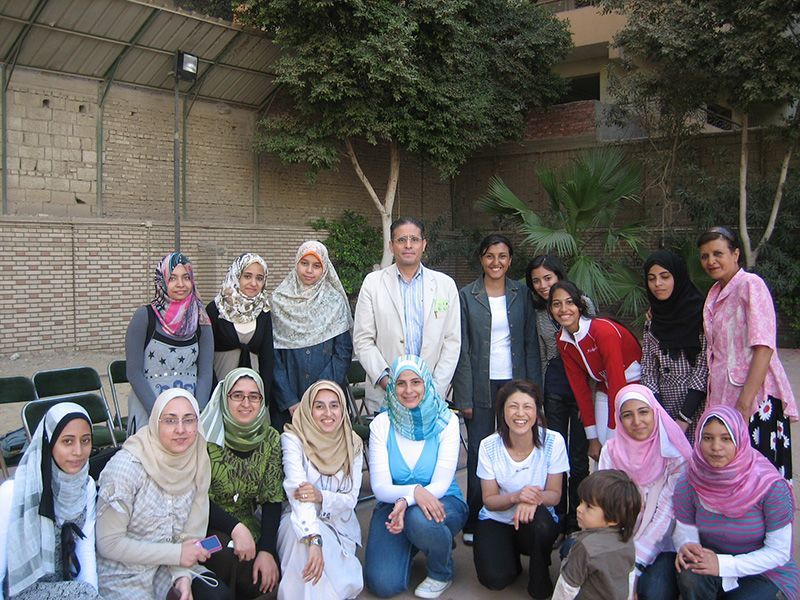 Professor Karam with students from the Department of Japanese and Japanese Literature, Cairo University
Professor Karam with students from the Department of Japanese and Japanese Literature, Cairo University
In the 1990s, the big attractions were anime and manga. In particular, the soccer manga Captain Tsubasa was a huge hit. In the Arabic version, the hero has an Arabic name and is known as Captain Majid. But even so, we had many applications from students who were knocked out by the appeal of Japanese manga culture and wanted to read the comics in the original.
This trend has continued into the new century, with the animated films of Miyazaki Hayao, such as Kiki’s Delivery Service and My Neighbor Totoro, breaking through to enjoy mainstream success. Recently, a number of the latest dramas from Japan have become popular via the Internet and satellite TV.
INTERVIEWER So it’s Japan’s popular culture that is bringing a lot of young people to study the language?
KARAM One tendency over the past few years, as Japanese tourism has increased, is that growing numbers of students are taking up Japanese in the hope of finding work in the tourist industry as guides or tour operators. Mastering Japanese puts them at an advantage when it comes to qualifying as guides or getting a job with a travel agency. So a lot of students are very keen to study Japanese. Today’s students are probably more driven than used to be the case.
Practical Skills or Academic Specialism?
INTERVIEWER What classes are popular with the students?
KARAM Translation classes are popular. There’s one class in which we translate the screenplay of My Neighbor Totoro. That’s always a big hit. And conversation classes—Egyptians are great talkers, you see. One problem we sometimes have in conversation classes is that students have a tendency to regurgitate whole passages they have learned by heart. Arabic speakers often memorize large portions of the Koran as children, so we tend to be quite good at learning things by heart. There’s a tendency for students to want to just memorize everything. But of course a real-life conversation is quite different from what’s in the textbook.
INTERVIEWER How would you characterize the student body today?
KARAM First of all, they’re extremely hard-working. They start Japanese from nothing when they enter the program, and in the space of four years they are able to read things like Izu no odoriko [The Izu Dancer] by Kawabata Yasunari [1899–1972], for example. Each class is graded on a 20-point scale, and the total from all classes is added up at the end of the academic year for a final grade. Every year, the five or so students with the best scores get to come to Japan for a year as exchange students with financial assistance from the Japan Student Services Organization [JASSO] and the Nippon Foundation. Naturally, with places on an exchange program at stake, they really throw themselves into their studies!
In 1994, we started a postgraduate program, and we currently have four masters students and two on the doctoral program. The overwhelming majority of students are women.
INTERVIEWER What do you think is the most important thing for a student learning Japanese?
KARAM To study Arabic properly. Of course, this goes for everyone, not just people studying Japanese. People who cannot use their own language properly find it very difficult to pick up foreign languages. In recent years, there has been a major boom in Egypt for learning English. The reality is that it is difficult to get a job if you can’t speak English, and as a result people are beginning to neglect Arabic. The Koran runs in the veins of the Egyptian people, so there is no danger that English will take over completely. Nevertheless, I sometimes wish students would take a bit more care over their own mother tongue.
INTERVIEWER Does Japanese face any serious difficulties as an academic subject? And if so, what are they?
KARAM There is a very strong emphasis on the practical side of language acquisition, and unfortunately this means that the number of students electing to take Japanese studies as a pure academic subject is falling. Very few students attend lectures on Japanese history or literature, for example. Pop culture is all very well, but Japan is also home to a much older and much deeper traditional culture. It is quite hard to get this across to the students. So that is one major issue for us: the question of how we can help students to understand the essence of Japanese culture.
Another problem is that university instructors are very poorly paid. Economically speaking, it is hardly an attractive profession. For this reason, many of our students choose to work as tourist guides or in other jobs that offer better pay. Very few are interested in becoming Japanese instructors.
There are some very talented instructors who have the abilities to translate modern contemporary novels and so on. But of course the reality is that there is still a lack of skilled workers in Egypt as a whole.
The Development of Japanese Language Education in the Arab World
INTERVIEWER How did the establishment of a Japanese language course at Cairo University come about?
KARAM The original impetus came with the oil crisis of autumn 1973. This was triggered by the Fourth Middle East War,(*1) which started when Egyptian troops entered the Sinai Peninsula, which was occupied by Israel at the time. The Arab countries raised the price of crude oil and in some cases banned oil exports to certain countries altogether based on those countries’ Middle Eastern policies.
The Japanese prime minister at the time was Tanaka Kakuei [1918–93]. He sent the deputy prime minister, Miki Takeo [1907–88], as a special envoy to the Middle East to express Japanese support for the Arab side. During his visit, Miki promised Japanese economic and cultural support. As a result of this, a Japanese language program was established at Cairo University. The aim was to increase the number of people in the Arab world with an understanding of Japan. At the time, the policy was mocked in Japan as “begging for oil diplomacy.”
But the Japan Foundation, which was in charge of administering the program, sent many outstanding scholars to the region, starting with Kuroda Toshio. The program attracted many ambitious students hungry for knowledge, and in the years since then the program has produced numerous Japan specialists. Regardless of what the initial objective may have been, nearly 40 years later the department has become an indispensable focus of Japanese studies in the Arabic-speaking world.
INTERVIEWER What is the state of Japanese language education in the wider Arabic-speaking world today?
KARAM Egypt is at the center of the Arab world, and Cairo has been the cultural hub of the Islamic world since taking over that role from Baghdad during the time of the Mumluk Sultanate [1250–1517]. It is a mecca of politics and culture, and that position remains secure to this day.
In that sense, it was highly significant that the first Japanese language program in the Arabic-speaking world was established in Cairo. Students wanting to learn Japanese could come together in the center of the Arab world and then return to sow the seeds of Japanese language education in their own countries. Egyptian graduates of the program have also gone to work in other countries in the Arab world, and today there are Japanese language courses at seven universities—in the Arabic-speaking countries of Egypt, Saudi Arabia, and Syria and also in Turkey.
The leading universities for Japanese studies are King Saud University [Saudi Arabia, 1993], Ain Shams University [Egypt, 2000], and Damascus University [Syria, 2002]. Japanese instructors sent out by the Japan Foundation also teach at universities throughout the region.
INTERVIEWER You have spent time in Saudi Arabia yourself, haven’t you?
KARAM Yes, from 1993 to 2002 I was on the faculty at King Saud University, where I helped lay the groundwork for Japanese language education in Saudi Arabia. Along with my Japanese and Egyptian colleagues, I worked for five years to create the first Japanese textbook in the Arabic-speaking world. Until then, we had relied on educational materials from Japan, but these were not always suitable for use in Saudi Arabia for cultural reasons: references to drinking alcohol, for example, or Buddhist temples. Sometimes they would offend Islamic precepts. In other cases, they just made the materials difficult for the students to understand. It was difficult to use the materials as they were. A lot of students said the same thing. So we produced a series of three Arabic textbooks that incorporate materials relating to Muslim pilgrimage and prayer, to make them better adapted to the requirements of Islam. The textbooks are now widely used throughout the Arab world.
The Importance of Diversity in an Era of Change
INTERVIEWER Tell us a little bit about your own background. What was it that first got you interested in studying Japanese?
KARAM I first encountered Japan via a famous poem called Ghada al-Yaban, or “Maiden of Japan,” which we studied in high school. It’s a very beautiful poem by Hafez Ibrahim [1872–1932], Egypt’s national poet. The poem praises the patriotism of the young nurses attached to the Japanese Army during the Russo-Japanese War. I recited it over and over until I had it by heart. I suppose I was also intrigued by the fact that the Japanese, a race of Orientals like us Arabs, had defeated the great Russian Empire in battle—and that spurred me to find out more about what kind of country Japan was.
In 1976 I entered the Department of Japanese and Japanese Literature at Cairo University, where I studied under Professor Kuyama Munehiko [now president of Caritas Junior College], who introduced me to everything from the basics of the kana syllabaries to the delights of Japanese literature.
In 1981, I entered the graduate school at the University of Tsukuba on a scholarship from the Japanese Ministry of Education, as it then was called. I studied under Muramatsu Takeshi [1929–94], who passed on his love of tanka. Professor Muramatsu was an important teacher for me. He opened the door to the wide world of Japanese classical literature for me—something for which I owe him an enormous debt of gratitude.
INTERVIEWER What was the subject of your research during your time at the University of Tsukuba?
KARAM My subject was “dreams in Japanese literature.” I was interested in the concept of dreams as they appear in Japanese literature, including religious texts, from the “Floating Bridge of Dreams” chapter in the Tale of Genji to Hōnen’s [1133–1212] dream in which he meets a great priest of the Chinese Pure Land sect, to the “Dream Diary” of the Buddhist priest Myōe [1173–1232]. When I came to write this up as my PhD dissertation, I also wrote about dreams that appear in the Old and New Testaments and the Koran. I received my PhD for this study in 1988.
INTERVIEWER What are you working on now?
KARAM Recently, I have been looking at the subject of suicide as a theme in Japanese literature: the aesthetic treatment of the double suicide as it appears in the plays of Chikamatsu Monzaemon [1653–1724], for example. The lyrical passages that describe the two lovers as they take their final journey together to their deaths present the idea of the “love suicide” as something extremely romantic and admirable. In the Arab countries, suicide is forbidden, and it would be unthinkable to describe the act of self-destruction as beautiful. But I think this attitude to death incorporates something essential about the Japanese aesthetic.
I’m extremely interested in the question of how this view of life and death came into being. In the field of modern literature too, the question of why authors such as Mishima Yukio [1925–70] and Kawabata Yasunari took their own lives is a fascinating subject. Kokoro by Natsume Sōseki [1867–1916] also takes suicide as its subject, and it is very popular with people in Egypt. For Arabs, although jihad is permitted, suicide is taboo, and I think there is something about the subject that fascinates because of that.
But although suicide is theoretically forbidden in Egyptian society, the reality is that increasing numbers of people are taking their own lives. Young people in particular are facing unemployment and other negative aspects of competitive society in an increasingly globalized economy.
INTERVIEWER Egyptian society as a whole seems to be undergoing dramatic change following the Arab Spring.
KARAM We don’t use that term ourselves, by the way. In Egypt, the spring is the season of sandstorms, so it’s not a time of year that has particularly positive connotations for us! But yes: The wave of democratization that began in Tunisia in December 2010 gradually spread to Egypt, and on February 11, 2011, Hosni Mubarak was forced to step down as president. Young people’s spiritual lives and worldview are undergoing major changes at the moment. In a time of flux like this, it is more important than ever to educate people so that they grow up with flexible minds that can incorporate diverse values.
In that sense, Japanese studies can have a significant impact, by teaching our young people about the culture of Japan, which developed in a temperate climate and landscape quite different from the Arab world. I sincerely hope that Japanese studies will continue to thrive in the years to come and that the subject can make a contribution to the work of forging a new future for the Arab world.
(Translated from an October 14, 2011, interview in Japanese. Interview and text by Kondō Hisashi, director of the Japan Echo Foundation. Photographs by Nagasaka Yoshiki.)
(*1) ^ Also known as the Yom Kippur or Ramadan War.
Egypt Cairo University Japan Foundation Koran Arab world Arabic King Saud University Ain Shams University Damascus University
